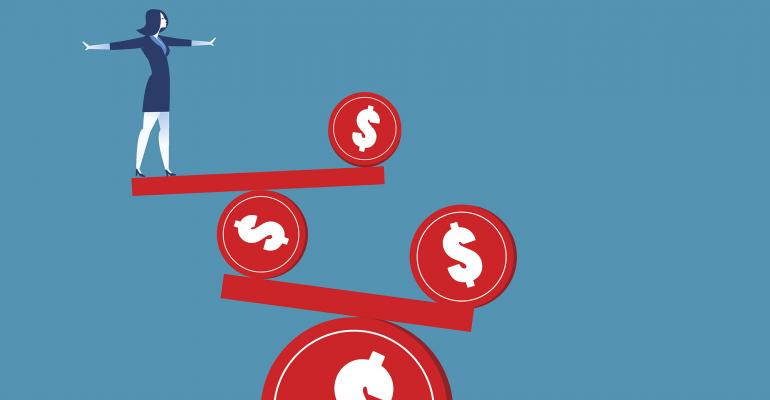In the news, we currently have a number of stories of bad behavior. Political shenanigans, sexual harassment, corporate malfeasance, gun violence, the media, etc. It doesn’t take much to understand what connects much of this. I’m thinking about power. Those with the power can take advantage of those without the power. It’s not complicated.
Think about a serial sexual harasser or a congressman or a corporation or the guy holding the gun or the talking head. They’re all in a position of power and, unfortunately, often go unchecked until another who gains power can level the playing field.
A turn in public opinion, law enforcement, a leaked email, video or recording, a whistleblower with documentation, another gun are all counterweights that help bring power back into equilibrium.
Your Client vs. A Global Industry
How does this relate to the life insurance industry? The client, an individual with maybe an advisor or two, is going up against a multi-trillion dollar global industry with over a century of experience in a space he visits maybe a couple times in his entire life. This would be a company that’s a part of an industry with access to data mining, predictive analytics, generations of human behavior studies and much more. An industry that employs more actuaries and lawyers than the number of people a given consumer knows in the world. You tell me how you think this is going to end.
It’s not difficult to think of a transaction you know little about but nonetheless a situation in which you must participate. Legal and accounting counsel, lenders, appraisers, inspectors and consultants of many types may all be a part of the deal. The larger the transaction, more may be involved and a greater cost of due diligence. After all, you don’t want to buy a house infested by termites, a commercial property on contaminated land, a company valued by inappropriate bookkeeping or a private equity transaction sold by a shyster. We all know this. Furthermore, if you don’t take the right steps to protect yourself, you aren’t going to get much pity when things go wrong.
A Dangerous Duo
Why in heaven’s name does life insurance play by a separate set of rules? I’ll watch someone move forward on a transaction for millions or tens of millions of premium dollars with no input from anyone other than the agent. In fact, I’ve watched them do so while their counsel frantically begs them to no avail to slow down and bring in an expert. Conventional wisdom can be exceptionally powerful and rational decision making seems to have a switch many can flick on and off at will.
Ignorance and arrogance are a mighty dangerous duo. “I’ve seen these life insurance schmucks; some of them aren’t bright enough to smell their way to an outhouse under a full moon. I’m a successful business owner/doctor/fill-in-the-blank. Clearly I can understand this as well as or better than them.” Maybe you can. But the truth is that your client knows almost nothing relative to what he needs to know to make sound decisions and protect himself.
Salespeople vs. Professionals
It’s important to remember that there are insurance salespeople and there are insurance professionals, and it can be very difficult to tell the difference. Remember that the best life insurance salesman isn’t just selling life insurance. The best and the brightest get duped regularly. Some of these salespeople and professionals are exceedingly bright and capable and ethical, putting together powerful strategies that will be very beneficial. Unfortunately, a certain percentage of these people are also very good at developing programs and building contracts that may look great but will be even more effective at lining their pockets, separating consumers from their wealth and leaving them high and dry. Tell me you can tell the difference, and I’ll try to stifle my laugh.
There’s a small circle of talented insurance consultants that we talk and work together regularly. For even a life insurance expert, there’s too much to know to be an expert in every niche. When an incredibly high-end, niche situation hits my desk, though I may know more than 99 percent of anyone out there (if someone knows more about it than me), I bring her to the table if an aspect of it is over my head, just as she may be calling me on the next case. Isn’t that what you would want, even if you didn’t expect it? We’re all sharing war stories and one-upping each other on the latest disaster to come across our desks. We’re constantly shaking our heads when smart people are so stupid. We’re all aware that it’s way to often a “pay now or pay later” deal, but too few people will accept this.
Understand the Uneven Balance
Back again to the balance of power issue. The powerful can take advantage of the weak. That’s not news. What is unfortunate is how few people understand when they’re powerful and when they’re weak. The powerful businessman is as fragile as a piece of china when it comes to the internal constructs of a policy. The requisite talents of the revered surgeon are anemic relative to the requirements to parse the ledgers and modeling. Even the mind of a finance guru is relatively feeble when it comes to interpreting the intricacies of these mind-numbing complicated contracts. The carriers build some incredibly powerful financial instruments, but they’re not all the same and they’re not for everyone.
To those who believe they have the power, they can be toyed with and not have a clue they’re really the mouse. An age-old sales strategy is to control you by getting you to believe you’re in control. To rebalance the inevitable power inequity you need to buy it. You might not think you need it, but by the time you realize you’re mistaken, you’ll be calling me for all the wrong reasons—and I’m cheaper today.





